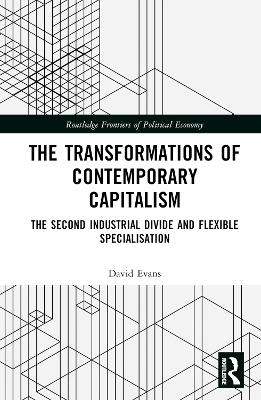
Transformations of Contemporary Capitalism
Routledge (Verlag)
978-1-032-39587-6 (ISBN)
In recent decades, there has been many attempts to describe, explore, and explain the new ‘post-modern’ capitalism of the twenty-first century. In this context, this book looks at one of the most exciting strands of this research in the late twentieth century: the flexible specialisation research programme (FSRP).
Drawing on the history of ideas, discourse, and literature on capitalism of the last four decades, this book shows that although ‘flexible specialisation’ anticipated some of the ways in which capitalism was being transformed in the late twentieth century, they underestimated and failed to anticipate the forms of ‘creative destruction’ and corporate digital control which were becoming embedded in the global capitalist accumulation dynamic itself. The sudden disappearance of the Soviet Union and the ‘end of history’ failed to open up the pathway for new forms of modern social democracy but gave rise instead to the new digital Behemoths. Today, the classical tendencies of capitalism as anticipated by Marx are all too present and, despite talk of ‘post-capitalism’ and ‘digital/techno-feudalism’, the landscape of monopolyfinance capital has consolidated itself. The book counterposes the FSRP with the various Marxist interpretations of the capitalist transition, together with the wider social and economic theories that emerged in the first decades for the twenty-first century around, for example, the ‘great acceleration’, de-growth, and post-growth.
This book will be of interest to all readers concerned with heterodox political economy, critical social theory, intellectual history, and, above all, the prospects for social transformation leading to social justice and an ‘egalitarian enlightenment’.
David J. Evans is an independent researcher.
Introduction Chapter One – Michael J. Piore and Charles F. Sabel: Flexible Specialization as an Alternative to Neo-Liberalism? Chapter Two – Flexible Specialization: A Progressive and Developing Research Programme? Chapter Three – Labour, Work, and Political Philosophy in Flexible Specialization. Chapter Four – Paul Hirst’s Journey to Flexible Specialization: From Althusserian Marxism to the ‘Third Way’ of Associational Democracy/Socialism. Chapter Five – Roberto Mangabeira Unger, Political Philosophy, and Flexible Specialization. Chapter Six – Politics, Regionalism and Flexible Specialization: Between Regionalism and Neo-Fascism? Chapter Seven – Capitalism, Marxism, and Flexible Specialization. Chapter Eight – Global Polycrisis after 2008 Chapter Nine – Social Theory in the Twenty-First Century: Beyond Flexible Specialization? Conclusion
| Erscheinungsdatum | 04.10.2023 |
|---|---|
| Reihe/Serie | Routledge Frontiers of Political Economy |
| Verlagsort | London |
| Sprache | englisch |
| Maße | 156 x 234 mm |
| Gewicht | 730 g |
| Themenwelt | Geschichte ► Teilgebiete der Geschichte ► Wirtschaftsgeschichte |
| Wirtschaft ► Allgemeines / Lexika | |
| Wirtschaft ► Volkswirtschaftslehre ► Wirtschaftspolitik | |
| ISBN-10 | 1-032-39587-7 / 1032395877 |
| ISBN-13 | 978-1-032-39587-6 / 9781032395876 |
| Zustand | Neuware |
| Informationen gemäß Produktsicherheitsverordnung (GPSR) | |
| Haben Sie eine Frage zum Produkt? |
aus dem Bereich


